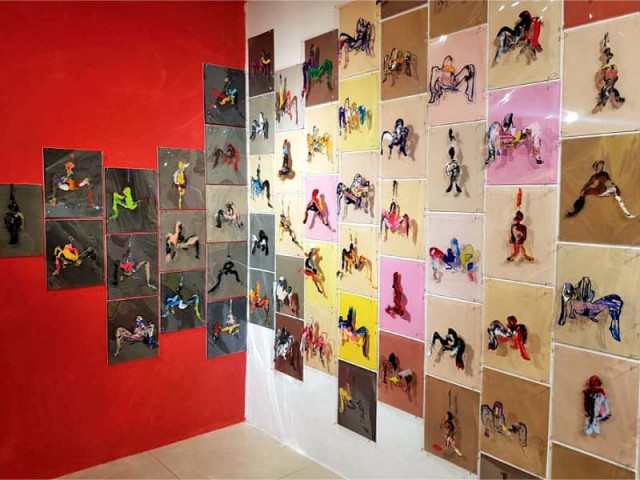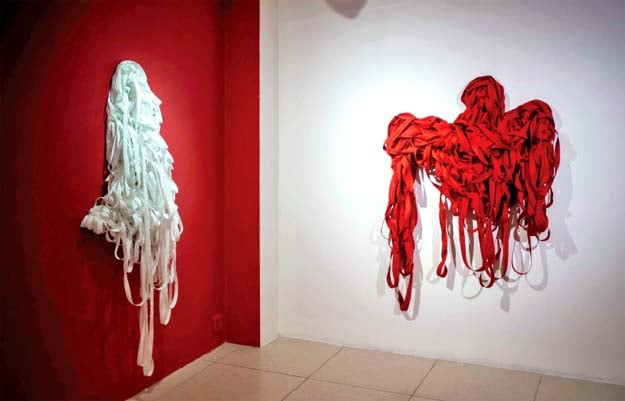Becoming a woman
Qinza Najm's latest body of works explores the unjust man-made cultural norms that continue to suppress women

Qinza Najm’s latest exhibition, titled ‘Becoming a woman’, raises questions about the set social customs for women, where every woman, in minor or major scenarios, is subjected to suppression . PHOTOS: MAHEEN AZIZ
In an art exhibition, titled 'Becoming a woman', that recently opened at Chawkandi Art Gallery, Qinza Najm, a Pakistani-American artist, raises these very questions about the set social customs for women, where every woman, in minor or major scenarios, is subjected to suppression - be travelling in a bus or living in a house. Curated by Nimra Khan, the show revolves around the exploration of these very unjust man-made cultural norms.
In her extensive series of work, Najm has shown two aspects of a woman - how society has shrunk her versus how she actually wants to live - freely. The red and white painted walls of the gallery highlight the contrasting artworks, while the artist has used vibrant and bright hues to enhance the strength, carefree and happy mood of the subjects she has portrayed. Her women don't feel shame, they don't hide and they use their very own bodies as the single act of protest against a system founded on oppression.
The silencing act
In her book, 'We should all be feminists', Chimamanda Ngozi Adichie writes, "We teach girls shame; 'Close your legs, cover yourself, ' we make them feel as though being born female they're already guilty of something. And so, girls grow up to be women who cannot say they have the desire. They grow up to be women who silence themselves."
Cops among six held for ‘gang-raping’ woman inside her home in Karachi
In retrospect of Adichie's context, which more or less conveys the gist of transitional shame that has been inherited through thousands of years of generational and conventional repression and gendered violence, Najm's work aims to dismantle just that - to rid the unasked guilt that is bestowed upon women and their bodies. Her work, therefore, speaks volumes without really saying anything - the simplest act of splitting the legs apart that brings about a visual revolution, the systemised brutality that women have made to internalise.
Adichie has been a powerful voice when it comes to discussions on gender on a socio-political landscape. One of her manifestos for girls is to "reject likability," calling it a waste of time, the very same time that could be used to become who you want to be as compared to someone else's visual boxification of you, much less society's.
The artist explored gender discrimination and female subjectivity which touched the topic beautifully. In most of her works, she has used zippers that connote to tightly pack or bind something. The artist interprets them as societal pressures on women and how they are practically zipped up from head to toe and cannot expand in their spaces whether in a house or a public place. They have to shrink themselves in order to feel safe only to escape the aggressive male gaze that imprisons them.

In one of her artworks, titled 'Reverse Gaze', the artist has added an open zipper and painted a belligerent lustful male eye peeking through it. She beautifully utilised the opened zipper to clear the notion of how a woman's existence, modesty and purity, is judged through her body. If she does not want to follow the set norms and laws and wants to breathe freely through the iron pillars set around her, then she is putting the whole family's honour at risk by being indecent and is considered to be welcoming men to showcase her body for.
SHC annuls death sentence awarded to man convicted of raping his daughter
In another piece, titled 'Claiming space', Najm has made multiple small and quick abstract gestural paintings on mylar, which rebels against the social responses towards women and claim more space as the paintings spread across the wall. From far, these small paintings look like a grid-formed plethora of abstract imagery, but on closer inspection, one would observe them as a movement of many women slowly spreading and breaking the cage of cringed-in limited spaces, while at the same time balancing attributes like patience, control, sensibility and maturity.
Society denies giving the lowest stature to women - from being an individual to the mere act of sitting, all dictated and institutionalised, all of which succumbs to an angry and rebellious woman which is portrayed in most of Najm's work. An array of abstract gestures painted on canvases posing differently - spread and shrunken. The slashes on these canvases depict emotional and physical wounds against violence, abuse and societal injustice towards her in the response of seeking freedom. Nevertheless, she keeps on growing and doesn't let the social pressure demean her existence so the slashes remain there, deep and open, like wounds that you grew from instead of succumbing under.
"My personal favourite is the work, titled 'Reverse Gaze', which concludes the whole story of what my work is about. I focused on the burden that society puts on a woman's shoulder and raise questions on how a woman should fight for her cultural and social rights," said Najm.
Her premise comprises notions on how a woman should no longer be apologetic for her femaleness and femininity, for all it does is breed generations of unhappy women who have "turned pretense into an art form." She enjoys her beauty and self-worth while spreading freely to claim her space which is looted by society.
The fine, understandable yet aggressive body of works argues with great vehemence to demand justice, space and equality. The socially constructed norms and laws for women always enticed Najm, yet she chose art as a forum to break through and visually put forward her notions. The show, 'Becoming a woman', will continue till November 12th, 2019.
Published in The Express Tribune, November 7th, 2019.



















COMMENTS
Comments are moderated and generally will be posted if they are on-topic and not abusive.
For more information, please see our Comments FAQ